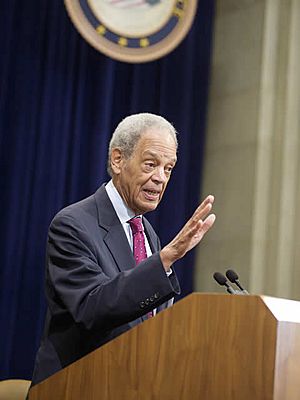Roger Wilkins facts for kids
Quick facts for kids
Roger Wilkins
|
|
|---|---|

Wilkins in 2009
|
|
| 15th United States Assistant Attorney General | |
| In office 1966–1969 |
|
| President | Lyndon B. Johnson |
| Preceded by | Mabel Walker Willebrandt (1929) |
| Succeeded by | Wesley Pomeroy |
| Personal details | |
| Born | January 29, 1932 Kansas City, Missouri, U.S. |
| Died | March 26, 2017 (aged 85) Kensington, Maryland, U.S. |
| Cause of death | Complications from dementia |
| Political party | Democratic Party |
| Spouse | Patricia A. King (until his death) |
| Residences | Washington, D.C., U.S. |
| Alma mater | University of Michigan (A.B., J.D.) |
| Occupation |
|
Roger Wood Wilkins (January 29, 1932 – March 26, 2017) was an important American leader. He was a lawyer, a civil rights activist, a history professor, and a journalist. He worked for the U.S. government as the 15th Assistant Attorney General. This was under President Lyndon B. Johnson from 1966 to 1969.
Wilkins was a member of the Democratic Party. Early in his career, he was guided by Supreme Court Justice Thurgood Marshall. During the 1960s, Wilkins worked hard to help pass important laws. These included the Civil Rights Act of 1964 and the Voting Rights Act of 1965. In 1965, President Johnson chose Wilkins to help solve problems about race in cities. Later, he became an Assistant Attorney General. His uncle, Roy Wilkins, was a leader of the National Association for the Advancement of Colored People (NAACP).
Roger Wilkins: Early Life and Education
Roger Wilkins was born in Kansas City, Missouri, on January 29, 1932. He grew up in Michigan. He went to Crispus Attucks Elementary School. Later, he attended Creston High School in Grand Rapids, Michigan.
He studied at the University of Michigan. He earned his first degree in 1953 and a law degree in 1956. While in college, he worked with the NAACP. He was also part of a senior leadership group called Michigamua.
A Career in Public Service
Wilkins first worked as a lawyer helping people in Ohio. At age 33, he became an Assistant Attorney General. This was during President Lyndon B. Johnson's time in office. He was one of the highest-ranking Black Americans in the government back then.
On February 4, 1966, Roger Wilkins was sworn in. He became the Director of the federal Community Relations Service. This ceremony took place at The White House. He helped solve problems between different groups of people.
Journalist and Professor
After the Johnson administration ended in 1969, Wilkins left the government. He worked briefly for the Ford Foundation. Then, he joined the editorial team at The Washington Post newspaper.
In 1973, Wilkins won a special award called the Pulitzer Prize. He won it with Carl Bernstein, Herbert Block ("Herblock"), and Bob Woodward. They won for showing the truth about the Watergate scandal. This event eventually led President Richard Nixon to leave office.
Wilkins left the Post in 1974 to work for The New York Times. Five years later, he worked briefly at Washington Star. In 1980, he started working as a news commentator for National Public Radio (NPR).
Later, Wilkins became a professor at George Mason University in Fairfax, Virginia. He taught history and American culture until he retired in 2007. He was considered a very important professor there. Wilkins also published The Crisis, a journal for the NAACP. His uncle, Roy Wilkins, was a former leader of the NAACP.
Roger Wilkins lived in Washington, D.C. He was married to Patricia King. She was a law professor at Georgetown University.
Wilkins passed away on March 26, 2017, in Kensington, Maryland. He was 85 years old. He died from problems related to dementia.
 | William L. Dawson |
 | W. E. B. Du Bois |
 | Harry Belafonte |

